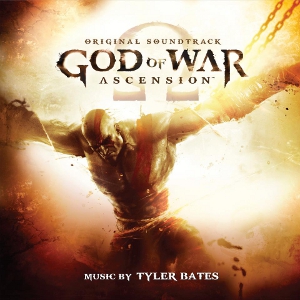God of War -Ascension- Original Soundtrack
 |
Album Title: God of War -Ascension- Original Soundtrack |
| Record Label: La-La Land Records (Physical Edition); Sony Computer Entertainment (Digital Edition) |
|
| Catalog No.: LLLCD-1249; N/A |
|
| Release Date: March 12, 2013; March 5, 2013 |
|
| Purchase: Buy at Amazon |
Overview
IGN got it right when they described the one of the God of War installments as “[redefining] what the word ‘scale’ means with regards to videogames.” Each game in the series rooted in loosely interpreted Ancient Greek mythology is an exercise in topping the previous game in terms of violence, grotesqueness, and sheer magnitude. The series is a hack-and-slash with themes of exceptional brutality and power – and it excels in its category in terms of both popularity and critic reviews. The hero, Kratos, former servant and future successor to the Greek god Ares, begins his quest in God of War: Ascension, the prequel to the original God of War. Most of the games are scored by a compilation of composers led by Gerard Marino, but Tyler Bates exclusively composed God of War: Ascension. The score is very appropriate for the game: raw, tough, and constant, and this style should feel pretty familiar to Bates after his score to the similarly themed movie 300, also featuring ripped, angry Spartans and gritty warfare. The score successfully captures the nonstop energy of the game and the dark themes of Kratos’ origin; while a bit repetitive outside the game, within context the music provides a wonderful soundtrack for the war-hungry Kratos as he proceeds on his journey, one death after another. The music was released digitally through Sony Computer Entertainment and physically by major film label La-La Land Records.
Body
Bates uses incorporates a combination of techniques throughout his score to increase the drama of the game; the very first track, “Primordial Rage,” opens with a slowly pounding bass drum at seemingly randomly intervals, offset by subdued vocals and various other percussion that take a backseat to the drum until a steadier rhythm begins about thirty seconds into the song. One of the signature techniques of the album shows up quickly afterwards – an intense and simultaneous crescendo and glissando. In this particular track, it takes place in the strings, brass, and vocals at the same time with an incredibly unsettling effect. “Ghosts of Kirra” introduces a more restrained setting of the melody most prominent throughout the game. The themes in this game all take place on a harmonic minor scale, the typically used scale in movies and games taking place in the ancient worlds, including Greece and Egypt. Ascension is rife with this scale, and it first shows up in its simplest and most direct form in “Ghosts of Kirra” with a rare woodwind/strings duo performance in an ascending pattern.
“Warrior’s Truth” is one of the more iconic tracks of this game and the series as a whole, taking the harmonic ascending scale and reverting it to a downwards pattern with a harsh choir/brass combination. It’s pulsing, dramatic, heavy, and it begins the action of the game, as it’s the track that plays as the player is first able to take control of the hero. It’s also the first track of the game that uses another one of Bates’ techniques: a strong melody sandwiched by regularly rhythmic heavy percussion and equally rhythmic high strings subdivided to create more movement against the slower bass instruments. In this case, he actually takes Gerard Marino’s iconic main theme for the series and twists it for the prequel setting. “Awakening of the Hecatonchires” brings some of these techniques together to create one seriously creepy track. After some subdivided bass percussion, a set of bass brass instruments enter with the crescendo/glissando technique, and are soon met with with screeching strings dragging a half-step pattern across the brass and percussion for a simultaneously eerie and pulse-racing effect. It’s another track that also highlights the majesty of the orchestra, orchestrated by Timothy Williams and recording at Abbey Road Studios.
Some of the tracks have moments of departure from this compositional design. “Visions of Ruin” opens with a lengthy dissonant chord and rough low male chorus shouting out some harmonic rhythms, but the piece then begins a haunting plucked solo delivering a pentatonic melody laced with Eastern vibes and a more traditional female choir singing a gently descending scale before the male choir returns. Before the piece is over, though, a few soloists alternate melody lines using a Middle Eastern scale; the various scalar patterns used in this piece are a departure from the rest of the soundtrack, and the particular notes used give the track an otherworldly feel. The following track, “Temple of Delphi,” brings a return of the plucked sounds from “Visions of Ruin” more prominently than the predecessing track, and we can hear that it is, in fact, a cimbalom — an instrument not often used in video games, and unexpected for this soundtrack. Perhaps the most well-known combination of cimbalom and heavy, bass instruments is on Hans Zimmer’s scores to the Sherlock Holmes films, scores I found to be very successful. Bates uses the combination differently, pitting the unlikely combination against various choral setups, but the effect is still pleasant, keeping the soundtrack from being monotonous with the stylistic variations.
Towards the end of the album, the pieces become relatively more peaceful beginning with “Python’s Path,” which is also the longest piece on the album at 4:29. The piece is set up slowly, with the irregular percussion from the opening track returning and interspersed with drawn-out chords from strings and vocals. Finally, over two minutes into the track, the percussion becomes more regular and fast-paced, and the drawn-out chords begin to fall into a slow melody line. It’s followed by “The Final Offer,” a piece I found strangely pretty (I’m not sure I can use that word anywhere else on the album). It opens with high strings holding out a chord that is, for once, not dissonant, and a soaring melody in the baritone brass. The melody and chord progression become almost poignant and is met with a mellow, ethereal alto choir supporting the chord changes in the higher strings. By the end of the piece, the heavy percussion/brass is back, but the break of the album that takes place in the first part of the track is a wonderful moment in the stormy weather of the album.
Summary
Overall, Bates created a continuous score that reflects the fast-paced, dark, and bleak world of God of War, rich in pseudo-mythology and mythological, gory violence. The music is powerful, rich, and pulsing, and while listening to the whole album can be repetitive, there are enough gaps in the action for moments of thoughtfulness, wonder, or even very brief pauses for tranquility. For any fans of the God of War games, this album lives up to the rest of the albums in the series (even if the game doesn’t); for anybody else, Bates has brought along his Hollywood ability for this score. If you’re into the dramatic, don’t pass this album up; however, the transitions between tracks are seamless enough that if you look for serious variety in your music, wait for Bates’ next score.
Do you agree with the review and score? Let us know in the comments below!
4
Posted on September 2, 2014 by Emily McMillan. Last modified on September 7, 2014.













